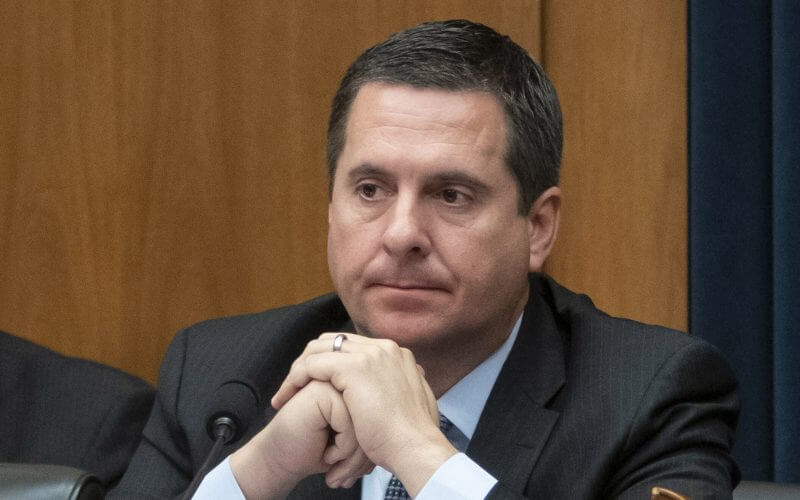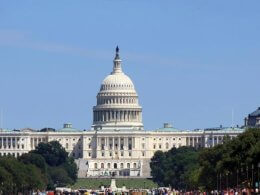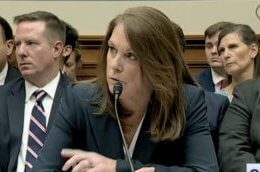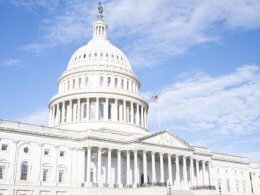In an extraordinary intrusion on congressional oversight, the Justice Department used grand jury subpoenas to secretly obtain the personal email and phone data of at least two top House Intelligence Committee investigators back in November 2017 just as they and their boss, then-Chairman Devin Nunes, were assembling bombshell evidence of FBI abuses in the Russia collusion probe, Just the News has learned.
The subpoenas, obtained by Just the News, show the DOJ demanded that Google turn over personal email and phone data from the two senior staffers on Nov. 20, 2017 and that responsive materials were to be returned to DOJ by Dec. 5, 2017.
The subpoenas were delivered during a critical time frame in the committee's effort to expose the Donald Trump-Russia collusion investigation as having been driven by an uncorroborated political opposition dossier funded by Hillary Clinton. Nunes' committee was locked at the time in a bitter struggle to force the FBI and DOJ to turn over records to the committee.
The DOJ subpoenas came to light in the last few days when the former committee staffers were informed by Google that their records had been taken, consistent with the Big Tech company's policy of alerting customers five years after law enforcement takes such actions.
One of the subpoenaed staffers, former Intelligence Committee senior counsel Kash Patel, told Just the News that the DOJ's subpoenas were an extraordinary intrusion on congressional oversight and raised serious concerns about the separation of executive and legislative branch powers guaranteed in the Constitution.
“It's so shocking,” Patel told the Just the News, Not Noise television show Monday night. "Because a co-equal branch of government, we as congressional investigators and Devin Nunes, his staff on House Intel were conducting constitutional demanded oversight of the fraudulent acts at the FBI and DOJ which we now know happened."
The other House Intelligence staffer whose records were subpoenaed by DOJ confirmed to Just the News he was notified last week by Google. He said he had worked extensively on investigating the FBI's Russia collusion conduct, including drafting the committee's report criticizing the FBI, reviewing sensitive documents and fighting with DOJ to gain access to the records.
Nunes said the subpoenas gave the DOJ and FBI unprecedented potential to learn in real-time what his investigation was learning about misconduct in the Russia probe. He called on the new Republican Congress to probe the subpoenas aggressively.
“The FBI and DOJ spied on a presidential campaign, and when Congress began exposing what they were doing, they spied on us to find out what we knew and how we knew it," Nunes told Just the News. "It’s an egregious abuse of power that the next Congress must investigate so these agencies can be held accountable and reformed.”
The subpoenas demanded a broad swath of records from Google, including "all customer and subscriber account information" for Patel and the other staffer, "addresses (including mailing addresses, residential addresses, business adresses, and e-mail addresses," user names, "screen names," "local and long distance telephone connection records" and even the "means and source of payment for such service (including any credit card or bank account number) and billing records."
The subpoena does not specify which component of the DOJ was leading the investigation, but included a numbering system suggesting it was being handled by the U.S. Attorney's Office in Washington D.C. At the time, DOJ had Special Counsel Robert Mueller investigating Russia collusion, the department's inspector general was probing FBI misconduct related to the Russia case, and several agencies were investigating leaks, including one traced to a former Senate Intelligence Committee staffer.
Spokesmen for the Justice Department and U.S. Attorney's Office did not respond to requests Monday for comment.
Former DOJ officials said since a legal dispute in 2007 over a DOJ raid of former Rep. William Jefferson's office, the department ordinarily would require subpoenas of congressmen or their staff to include approval from the attorney general as well as some form of notification to congressional leadership. It is unclear whether those procedures were followed in the 2017 matter.
In the Russia collusion case, then-Deputy Attorney General Rod Rosenstein assumed the attorney general's powers when Attorney General Jeff Sessions recused himself. Rosenstein did not respond to a request by email and phone to his office for comment on Monday. Former House Speaker Paul Ryan did not immediately respond to a request for comment.
Nunes and Patel said they have long suspected the FBI or DOJ might be monitoring their communications, especially after Rosenstein made a threat during a January 2018 meeting to subpoena committee members or staff.
"“In this one meeting, in particular, Rod Rosenstein, who's known for losing his temper, had done so before and in this meeting, screamed at the chairman of the House Intelligence Committee and myself. And he literally said verbatim, if you're going to continue this investigation, I'm going to subpoena you and your records, looking at the chairman of the House Intelligence Committee and looking at his senior counsel and chief investigator on the Russiagate," Patel recalled.
Harvard University law professor emeritus Alan Dershowitz told Just the News that while more information needs to be learned that the subpoenas raised serious concerns about separation of powers between Congress and the executive branch.
"It's a violation of the separation of powers. Look, our Framers specifically separated legislative, executive and judicial powers. And that was saying -- all kinds of efforts to overcome them -- that Congress is independent and has the right to investigate.
"And the Justice Department shouldn't be investigating the investigators unless there is fairly substantial proof of, of criminal conduct. So we don't know the whole story yet. But I'm very suspicious of subpoenas being issued by the grand jury," he added.
Just weeks before the staffers' emails were subpoenaed, Nunes' committee issued a series of its own congressional subpoenas demanding the FBI, DOJ and CIA turn over evidence that would eventually show the FBI knew that Christopher Steele's dossier had been funded by the Clinton campaign and had been portrayed to the FISA court as credible when in fact agents had determined it contained debunked or unverified claims.
The two staffers whose emails were targeted had both been allowed in a classified environment to read the FBI's then-secret FISA warrants targeting the Trump campaign and its adviser Carter Page and had begun pressing the federal agencies on what the FBI failed to tell the FISA court before it obtained four extraordinary intelligence warrants.
By February 2018, the committee's investigative work resulted in a lengthy report known as the "Nunes memo" that provided the first proof that the FBI's investigation was seriously flawed. Eventually, Mueller would conclude that there wasn't evidence that the Trump campaign colluded with Russia to hijack the 2016 election as Steele had alleged.
Subsequent investigations found widespread failures and abuses by the FBI in the probe, including failing to disclose exculpatory evidence to the FISA court and doctoring evidence. One former FBI lawyer pleaded guilty to wrongdoing.
The DOJ subpoena for the House staffers came in the middle of a tumultuous battle in fall 2017 in which congressional leadership sought to compel the FBI and CIA to turn over evidence sought by the House Intelligence Committee. That fight included the following sequence of events:
- Aug 24, 2017: House Intelligence issues subpoenas to FBI Director Chris Wray and Rosenstein for all documents related to Christopher Steele and the Steele dossier, and anything indicating whether Steele dossier info was used in FISA warrants or otherwise in the special counsel's Russia collusion investigation.
- Sept. 1, 2017: Nunes sends a letter to Sessions blasting DOJ and FBI for not complying with the Aug. 24 subpoena.
- Oct 24, 2017: Washington Post reports lawyers for the Clinton campaign are going to confirm to the House Intelligence Committee that the campaign helped fund the Steele dossier.
- Oct 28, 2017: Fusion GPS, the opposition research firm hired by the Clinton campaign, agrees to settle litigation against a House Intelligence Committee subpoena that allows Nunes to have access to banking records showing who funded the dossier.
- Dec 2, 2017: FBI announces that FBI agent Peter Strzok, who led the Russia probe early on, was removed from Mueller's team due to anti-Trump text messages. Nunes issues press release accusing FBI and DOJ of obstructing his investigation by refusing to comply with Aug. 24 subpoena. Nunes threatens to file contempt of Congress resolution against Rosenstein and Wray unless they comply.
- Dec. 7, 2017: House Ethics Committee clears Nunes of charges filed by Democrats.
- Jan. 10, 2018: Rosenstein threatened to subpoena House Intelligence Committee over leaks.
- Feb 2, 2018: Nunes memo released to public raising first official substantive concerns with FBI probe of Trump-Russia collusion.










